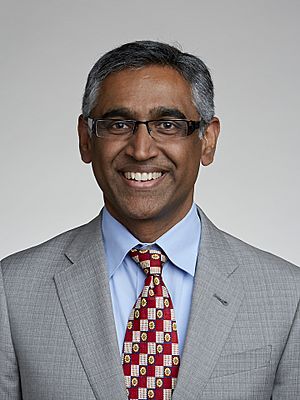Ramanujan Hegde facts for kids
Quick facts for kids
Ramanujan Hegde
|
|
|---|---|

Hegde in 2016
|
|
| Born | 1 April 1970 Kumta, Karnataka, India
|
| Alma mater |
|
| Awards | EMBO Member (2013) |
| Scientific career | |
| Fields | Biochemistry |
| Institutions | |
| Thesis | The regulation of protein translocation at the endoplasmic reticulum (1998) |
| Doctoral advisor | Vishwanath R. Lingappa |
Ramanujan Shankar Hegde, born on April 1, 1970, is a brilliant scientist. He leads a research group at the Medical Research Council (MRC) Laboratory of Molecular Biology (LMB) in the UK. He is known for his important work on how proteins work inside our bodies.
Contents
His Schooling and Studies
Ramanujan Hegde went to the University of Chicago for his first degree. Later, he studied at the University of California, San Francisco. There, he earned two advanced degrees: a Doctor of Medicine (MD) in 1999 and a PhD in 1998. His PhD research focused on how proteins get to the right places inside cells. This work was supervised by Vishwanath R. Lingappa.
What Dr. Hegde Researches
Dr. Hegde's research looks into how proteins are sent to the correct spots within our cells. He also studies how cells find and get rid of proteins that are not made correctly. These processes are super important because if abnormal proteins build up, they can harm how cells work. This can lead to many different diseases.
Discoveries About Proteins
Dr. Hegde's lab has found a special way that some proteins reach their correct places. These places are often inside cell membranes. His studies help us understand how cells recognize these proteins. They also show how cells make sure the proteins are put in the right spot.
Dr. Hegde's work has also shown that even small mistakes can cause big problems. For example, if just a few proteins go to the wrong place, it can lead to brain diseases like neurodegeneration. His team found that cells have special ways to find these "lost" proteins. Then, the cells mark them to be destroyed so they don't cause harm.
His research has been published in top science magazines like Science, Nature, and Cell. The Medical Research Council has helped fund his important work.
Awards and Special Recognitions
Dr. Hegde has received several awards for his scientific achievements. In 2008, he was given the R.R. Bensley award in Cell Biology. He became a member of the European Molecular Biology Organisation (EMBO) in 2013. In 2016, he was also chosen to be a Fellow of the Royal Society (FRS). This is a very high honor for scientists in the UK.
Images for kids


